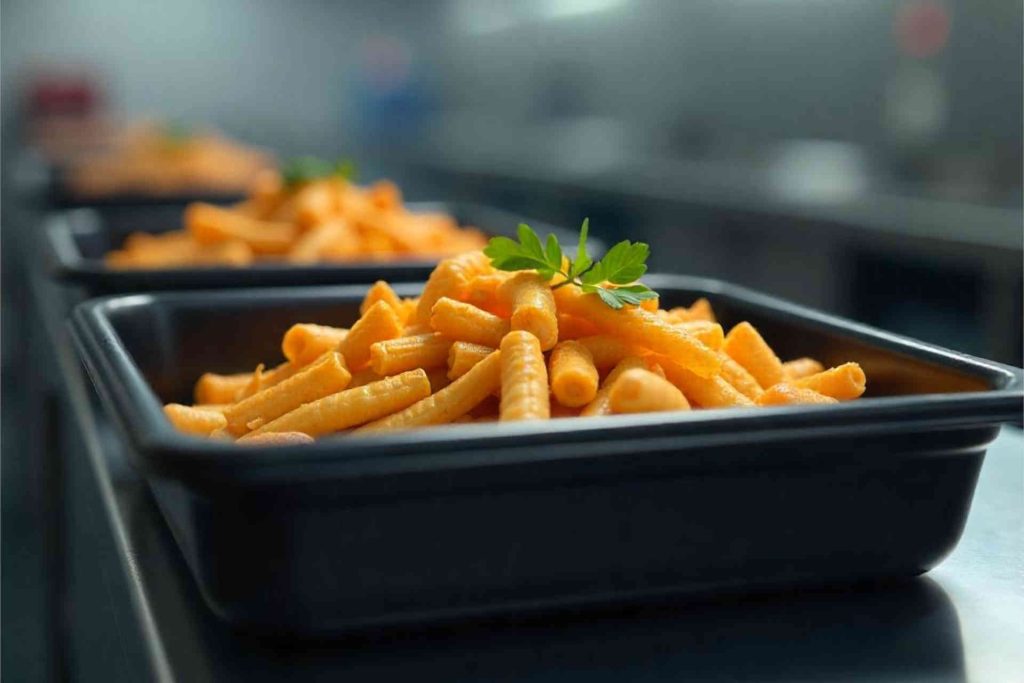
“Our goal is to draw attention to the inconspicuous but massive waste stream in communal catering.”
Victoria Berger, CEO & Founder of and-less
Vienna-based start-up and-less is revolutionizing commercial kitchens with a simple but ingenious reusable idea: Sustainability in the hospitality industry doesn’t start with the guest’s plate – it often starts much earlier, behind the scenes. One example of this is communal catering: every day, thousands of meals are delivered to schools, nursing homes, and canteens in disposable containers, which end up in the trash immediately after being emptied. Barely visible to the public, this creates a mountain of waste that, according to and-less, is equivalent to the area of around 181 soccer fields every year.
With the and-less XL, the Vienna-based company is now launching a practical solution onto the market: a reusable, sealable reusable tray in the standard 1/2 GN size, specially developed for cook-chill processes. Existing stainless steel alternatives have often been too heavy or not leak-proof enough – one reason why many large companies continue to rely on disposable packaging despite their sustainable intentions.
The advantages speak for themselves: with 5,000 trays in use and an average of 250 cycles per year, over 1.25 million disposable containers and up to 250 tons of plastic waste can be avoided – without any changes to logistics processes.
The system is also a game changer in economic terms: the reusable tray is cheaper than disposable containers after just three uses. Large companies can save between €40,000 and €60,000 per year, depending on disposable prices and cleaning structures. This makes the and-less XL not only an ecological statement, but also a relevant business tool.
“Sustainability doesn't have to be complicated – it has to work.”
Philip Kohlbecher, co-founder & product developer at and-less

There is a tension between digital progress and emotional hospitality that is redefining the restaurant industry. AI, automation, and data-based processes are changing not only workflows, but also attitudes, communication, and expectations. What was once considered a gimmick is now becoming a strategic necessity. And perhaps the most important question of our time: How can humans remain relevant in a world that is becoming increasingly digital?
The Austrian brand Kumanu shows how circular thinking can be applied in everyday life—and makes doing without plastic both practical and aesthetic. With its “Frischefritz” beeswax wraps and ‘Krümelkarl’ and “Pausenpaul” bread and snack bags, it provides the industry with a well-thought-out solution for keeping food fresh for longer – without any plastic or aluminum foil.
The products are made from GOTS-certified organic cotton, organic beeswax from Austria and Germany, and tree resin from traditional pitch production – a combination that has an antibacterial effect and guarantees natural durability.
Leonardo Hotels is expanding its commitment and turning World Cleanup Day 2025 into a European movement: Employees from 140 hotels in 12 countries are participating in cleanup campaigns – from Berlin to Bucharest, from London to Rome. Instead of a single day, the period has been extended to ten days to allow as many teams as possible to participate.


Vienna-based start-up and-less is revolutionizing commercial kitchens with a simple but ingenious reusable idea: Sustainability in the hospitality industry doesn’t start with the guest’s plate – it often starts much earlier, behind the scenes. One example of this is communal catering: every day, thousands of meals are delivered to schools, nursing homes, and canteens in disposable containers, which end up in the trash immediately after being emptied. Barely visible to the public, this creates a mountain of waste that, according to and-less, is equivalent to the area of around 181 soccer fields every year.